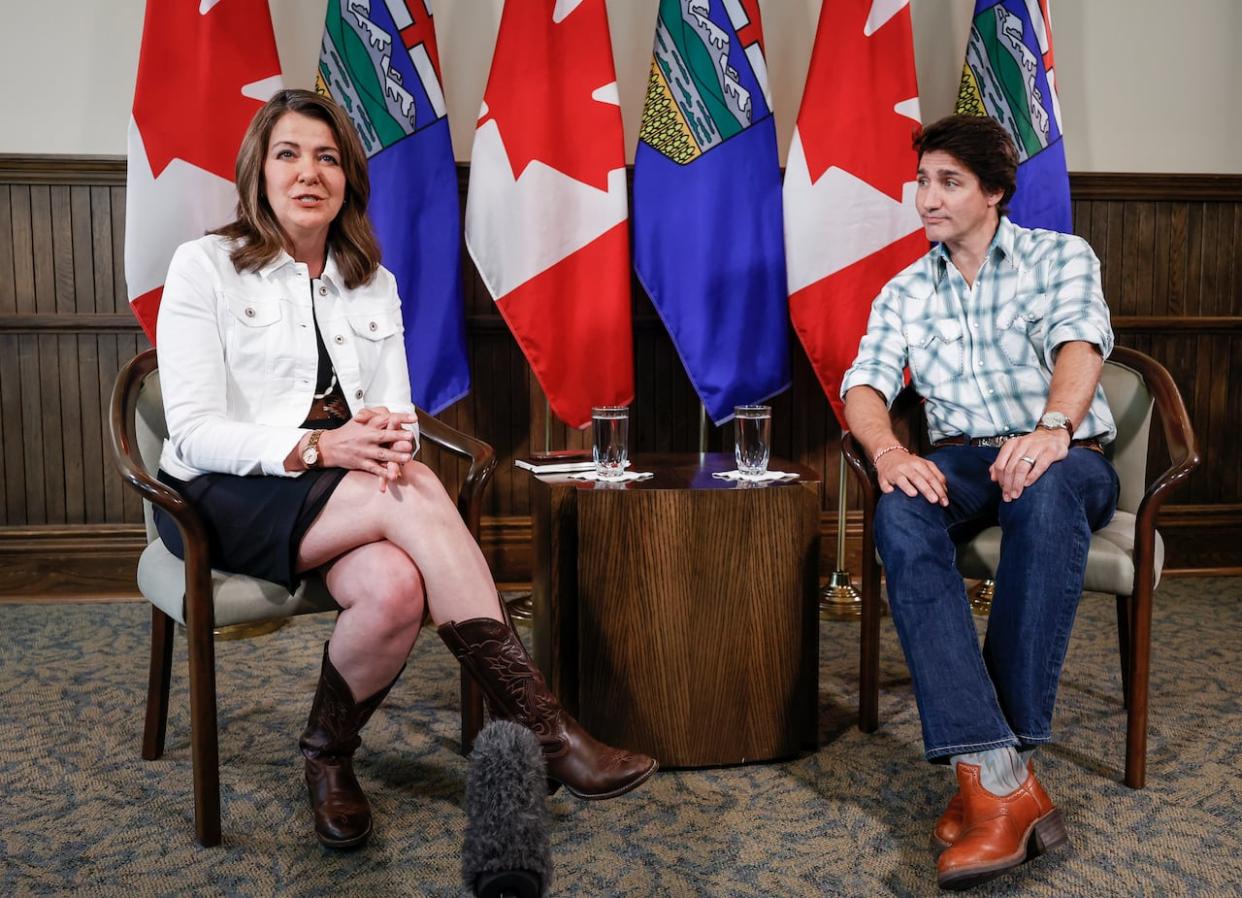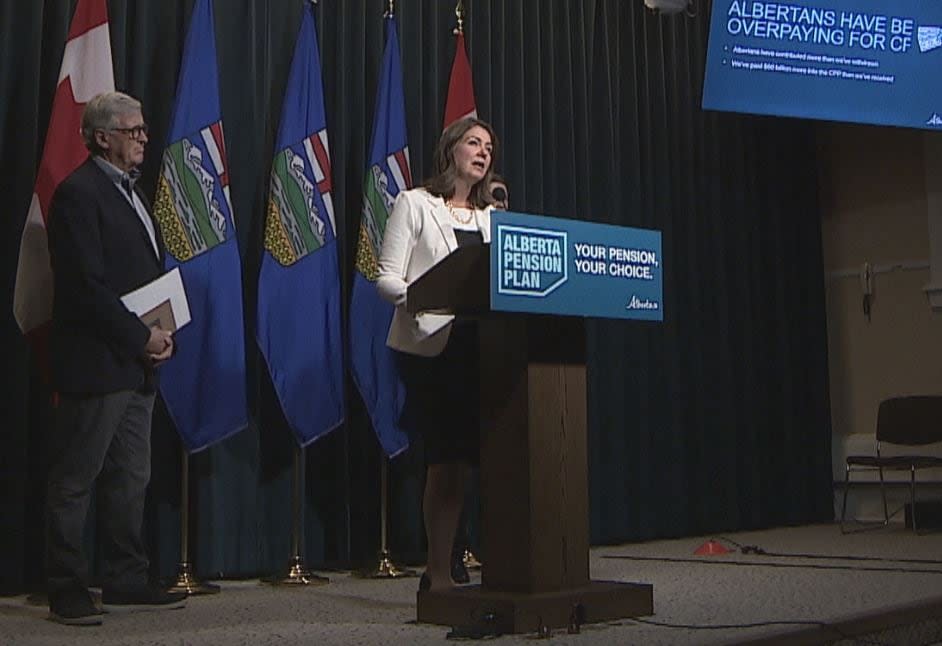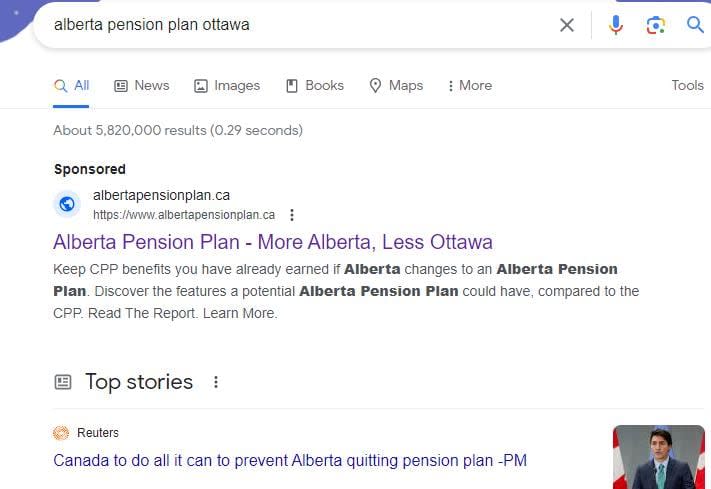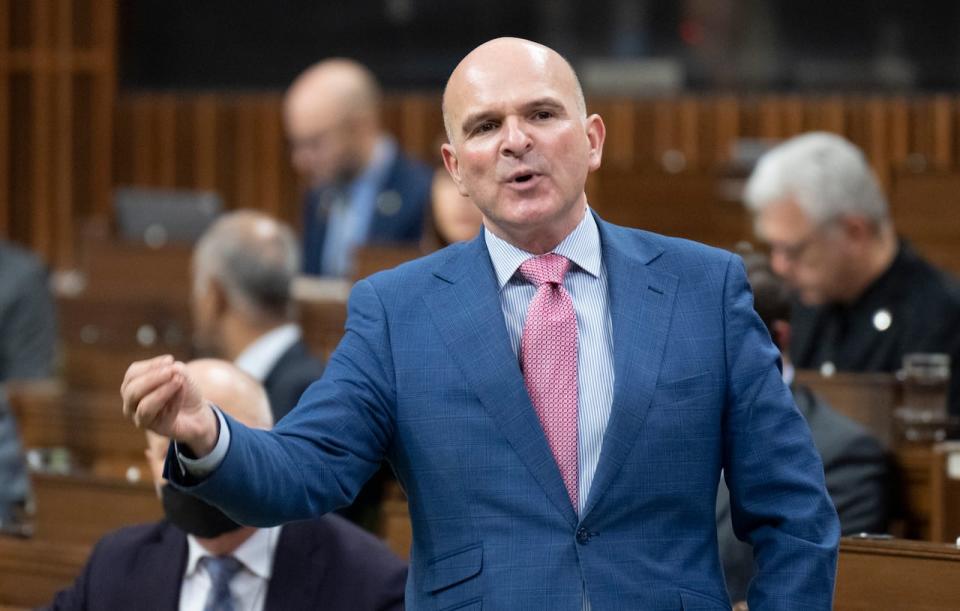Pension becomes another Alberta-Ottawa fight. But this time, Trudeau's on offence

Jim Dinning, engagement panel chair: Thank you, Duane from Camrose. We appreciate all your comments on the potential Alberta Pension Plan. Isn't this telephone town hall format a swell idea? Sarah, please put through the next call.
Operator: Our next commenter is Justin, and he's on the line from Ottawa.
OK, so it didn't quite happen this way, but may as well have.
As limited as the province's engagement process has been thus far on Alberta going it alone on pension — a sunny-side-up questionnaire and phone-in forums — the largest stakeholder in this matter was bound to weigh in.
On Wednesday, Prime Minister Justin Trudeau issued his apparent opening salvo in what's becoming a federal-provincial pension dispute, and it was an open letter to Premier Danielle Smith. This sort of intergovernmental communications is part unquiet diplomacy, part public relations, and Smith should know, as a frequentpractitioner of thisepistolarygesture.
To all of whom it may concern
Trudeau's public plea to not rend asunder the Canada Pension Plan comes nearly one month after Smith launched her persuasive go-it-alone pitch for Albertans to pay less, get more, and take for themselves 53 per cent of the national retirement fund's assets.
"The harm it would cause is undeniable," the prime minister wrote. "Withdrawing Albertans from the Canada Pension Plan would expose millions of Canadians to greater volatility and would deny them the certainty and stability that has benefited generations."
Trudeau added in his letter that he's instructed his cabinet and officials to "take all necessary steps" to make clear the risks of the Alberta pull-out plan, and to "do everything possible to ensure CPP remains intact."
Smith, who recently warned Albertans would freeze in winter blackouts under Ottawa's net-zero plan, promptly replied with a Dear-Justin letter, accusing him of trying to "stoke fear in the hearts and minds of Canadian retirees."

Premier Smith has named former Alberta provincial treasurer Jim Dinning, left, to lead a panel to guide an engagement process on the Alberta pension idea that detractors say is shoddy and tilted toward Smith's preference to leave CPP. (Jocelyn Boissonneault/CBC)
There was not a single number in Trudeau's letter, with no attempts made to counter the provincially commissioned report from Alberta, which stoked hope the province is entitled to $334 billion of CPP assets, and Alberta Pension Plan's annual contribution rates could initially be $1,425 lower for Albertans. Smith says that compares to "only" $175 more for those in the eight remaining CPP provinces.
"The Prime Minister would be far more constructive if he responded and gave us an alternative calculation," Smith told reporters. "Like, what does he think the actuaries would say?"
Not only has Ottawa not provided its own analysis, nor has the pension-stewarding Canadian Pension Plan Investment Board, whose executive Michel Leduc suggested last month that Alberta's likely asset claim is around or below 20 per cent, without showing CPPIB's arithmetic.
Rather, the pension board issued this week a commissioned critique of Smith's engagement process thus far, which consists of cheery ads, a website that only touts the idea's virtues, a survey that doesn't offer chances to naysay, and no in-person consultations.
In Google searches this week, I spotted an ad from the province headlined "More Alberta, Less Ottawa" — the old anti-Ottawa activists' refrain from the 2001 "firewall letter" that advocated the pension withdrawal. At the first telephone town hall of his engagement process, Dinning himself evoked that old slogan to characterize the Albertans who believe the answer on an APP is "yes, no matter what."

The Alberta government's ads about quitting the Canada Pension Plan stress the positives of that idea, and this one uses an old grassroots Alberta-first, anti-Ottawa slogan to make its pitch. (Google/screenshot)
While the Dinning panel and ads lean solely on Alberta's Lifeworks report, economist Trevor Tombe has produced his own financial appraisal, estimating the provincial report overstates the province's fair claim by half or more — a starting pool for a provincial fund that wouldn't mean quite as rosy an upside for ratepayers or pensioners.
More numbers from reputable sources would surely enrich this debate. Employment Minister Randy Boissonnault hinted some federal analysis could be forthcoming as part of the Trudeau government's response. "The numbers are going to be crunched very carefully over the next year," the Edmonton Liberal MP told reporters Wednesday, careful to not specify who will crunch.
Assumedly, something will come of Trudeau's rare public summons for his team to fight back on an Alberta measure vis-à-vis Ottawa.
This appears to be the first time he's done so, despite all the provocations, lawsuit threats and Sovereignty Acts to have come from Smith (and Jason Kenney before her).
This hasn't happened in the carbon tax fight, nor other climate measures, nor flirtation with leaving the RCMP, nor a referendum against federal equalization.
So why now?
The savings game
As this is Ottawa (and Alberta), let's sniff around and suggest politics may be at play. This is another rare case: Trudeau staking a position against an Alberta premier in which the Liberals are on the side of Alberta popular public sentiment, with polls repeatedly showing more support staying in the CPP than bailing on it.
Trudeau Liberals could also see an opportunity to notch points against Conservative Leader Pierre Poilievre, who hasn't yet planted his marker in the Alberta pension debate.
When Calgary MP Stephanie Kusie asked Wednesday in Question Period about government deficits, Boissonnault rose to upbraid her about Conservatives being ""absolutely silent on a matter that really affects the middle class in Alberta."

Federal Employment Minister Randy Boissonnault used Alberta's CPP debate to jab at Conservatives in Question Period, arguing its MPs are quiet on a plan that threatens Canadians' retirement finances. (Adrian Wyld/The Canadian Press)
A third potential reason for Trudeau's fighting spirit to defend CPP is that this has a different potential impact than most of Alberta's other plans to retrench from Ottawa influence. When premiers rail against federal climate or natural resource plans, they argue that an economically stronger Alberta makes a stronger Canada.
This is more zero-sum. Alberta yanking out a chunk of the CPP fund and shrinking the contribution pool would diminish the retirement program for everybody left behind.
The national fund's investing clout may be weaker, and the removal of a currently younger, more prosperous group of working Albertans would materially cost other Canadians more. Whether it's $175 as Smith claims or whatever someone else may estimate, nobody denies there wouldn't be an impact, at a time when the cost of living is everyone's big topic.
No one knows what the future holds for either side, but volatility inevitably rises for both with smaller funds and groups more vulnerable to decades-long demographic shifts.
The province has been tiptoeing toward a potentially monumental 2025 referendum and a major Alberta-Canada divorce, with only one side of the relationship making its unvarnished case.
That has now changed. It requires Smith to battle with two forces simultaneously: a CPP that Albertans are reliably fond of, and a prime minister they are not.
With files from Chris Rands


